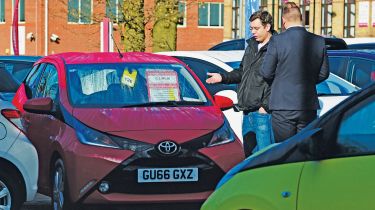One in 10 car dealers close in face of £160 million tax hike
More closures feared as rising business rates bite; online car sales also threaten traditional dealership model

The traditional car dealership is under threat from rising business rates and online sales, with one in 10 dealers shutting up shop in the last seven years, new figures have revealed.
Since 2010, 574 dealers across England and Wales have closed, and planned business rate increases are likely to hit dealers to the tune of £158 million over the next five years.
• Is Hyundai Rockar the future of car sales?
Research from the real estate analysts the Altus Group show at the start of April 2010, there were 6,320 dealerships in the UK, but that number had fallen to 5,746 by April 2017.
And a change in the way business rates are calculated is set to put a further squeeze on retailers, with car showrooms' rates projected to increase by £158.45 million over the next five years – equivalent to £31.6 million a year.
With UK car sales down 5.7 per cent in 2017, consumer confidence low and the threat of online sales rising, traditional car retailers are facing pressure from all sides. Vertu Motor, which has 121 branches across the UK, reported a 13.2 per cent like-for-like fall in sales over the last third of 2017, with used car sales dropping by 3.2 per cent over the same period.
Robert Hayton, executive vice president of business rates at Altus Group warns that dealers “should expect further increased liabilities if investing” and need to “rapidly respond to changes in motoring technology, car usage and ownership models”.
Half of all dealers could close by 2025
This latest report follows an earlier forecast that warned half of all forecourts could close by 2025.
Accountancy firm KPMG’s survey of 907 leaders from the automotive industry found the vast majority (85 per cent) felt that between 20 and 50 per cent of dealerships would close within seven years. Over half (54 per cent) felt at least 30 per cent of forecourts would close by 2025, while 94 per cent of respondents said they thought at least 10 per cent of physical dealers will no longer exist by that date.
The report’s authors call the results a “warning sign” for retailers, saying they present "a need to rethink retail concepts and business models, particularly with customers purchasing more of their goods and services at the touch of a button."
Many retailers are already preparing for a shift towards online sales. Earlier this year, Citroen announced it aims to sell 10 per cent of its cars online by 2021. Hyundai, Peugeot and a number of other manufacturers have also launched online sales platforms, as carmakers seek to cater to consumer tastes for buying goods from the comfort of their own homes.
Other predictions revealed by KPMG’s annual survey of leading automotive executives include the fact that 77 per cent of those polled felt internal combustion engines will be more important than electric drivetrains “for a very long time”.
The survey also predicted that fuel cell vehicles would become the number one key trend until 2025 - overtaking electric vehicles based on last year's poll - while the number of executives believing diesel remains a “technologically viable option” climbed to 50 per cent, up three points from 2017.
What are your rights when buying a car online? Our guide to buying a car online explains all...
Find a car with the experts



